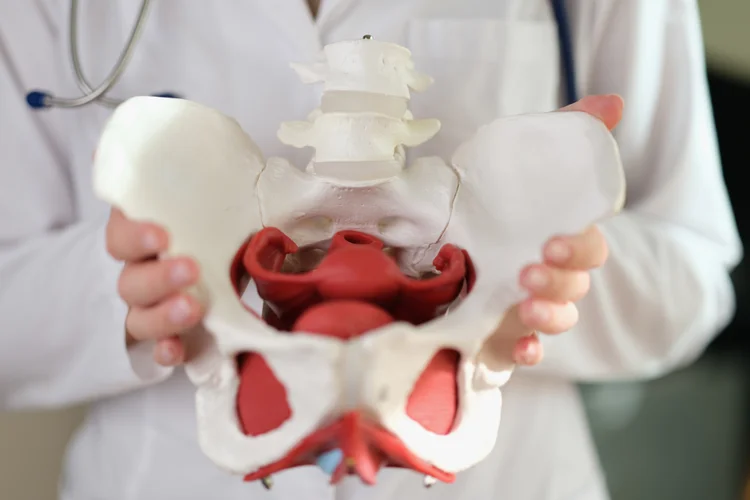Hip Specialist Singapore
Information reviewed by: Dr. Foo Gen Lin | Last updated: Oct 29, 2025
Is hip pain limiting your ability to walk, sit, or stay active? Dr Foo provides thorough assessment and personalised care to help relieve your discomfort and improve mobility.
MBBS (University of London) | MMed (Ortho) | FRCSEd (Ortho) | FAMS (Ortho)


What Does a Hip Specialist Do?

A hip specialist diagnoses, manages, and treats a range of conditions affecting the
hip joint, including both acute injuries and chronic disorders.
This may involve non-surgical approaches such as physiotherapy and
injections, or surgical procedures like arthroscopy or joint replacement.
At Apex Sports Clinic, our orthopaedic specialists provide patient-centred hip
care designed to relieve pain, restore mobility, and help you return to the
activities you value, whether it is daily movement, recreational fitness or competitive
sport.
Common Hip Conditions We Treat
Hip problems can arise from injury, degeneration, inflammation, or structural abnormalities. Our specialists routinely manage conditions such as:
Common Symptoms of Hip Conditions
Hip conditions can present with a variety of symptoms, which may range from mild discomfort to significant limitations in movement. Common symptoms include:

- Groin pain, typically a deep ache that worsens with walking, twisting, or rising from a seated position.
- Outer hip pain, felt as sharp or burning discomfort, especially when standing or lying on the affected side.
- Stiffness and reduced mobility, making it hard to bend, rotate, or straighten the hip.
- Limping or uneven walking, often due to pain or reduced joint function.
- Pain radiating to the thigh or buttock, which may increase with movement or prolonged activity.
- Clicking or locking in the hip, sometimes with a sense of catching during movement.
- Weakness or instability, where the hip feels unsteady or struggles to support weight.
Our Approach to Diagnosis and Assessment
At Apex, evaluating hip pain and related issues typically involves a combination of clinical examination, movement analysis, and advanced imaging. A comprehensive assessment may include:
- Physical examination and range-of-motion testing
- Gait analysis to identify movement irregularities
- X-rays to assess joint structure and alignment
- MRI or CT imaging for soft tissue or labral evaluation
- Ultrasound to visualise tendons, bursae, or guide precision injections
This approach helps differentiate between joint, muscular, tendon, or nerve-related causes and supports the development of a treatment plan based on the underlying diagnosis.
Treatment for Hip Conditions

Treatment for hip conditions depends on the underlying cause, severity, and your
lifestyle goals.
We believe in prioritising non-surgical care wherever possible, focusing on
restoring function and relieving pain through targeted, conservative methods. Surgical
options are considered only when symptoms persist or significantly limit your
quality of life.
Treatments we offer for hip conditions include:
| Treatment | Description & Purpose |
|---|---|
| Non-Surgical Management | |
| Lifestyle Modification | Changing or avoiding daily or sporting activities to reduce physical strain on the hip joint. |
| Pain Management | Anti-inflammatory medication used to relieve pain and reduce inflammation. |
| Physiotherapy | Targeted exercise programme designed to improve hip strength, flexibility, and joint control. |
| Image-guided Injections | Used to reduce inflammation, relieve pain, or improve joint lubrication in targeted areas of the hip. This may include corticosteroids, hyaluronic acid, or platelet-rich plasma (PRP). |
| Surgical Intervention | |
| Hip Arthroscopy |
Small-incision procedure to treat soft tissue damage, remove bone spurs, or improve joint
function.
Commonly used to treat:
|
| Hip Osteotomy |
Surgical realignment of the hip bones to improve joint mechanics, often performed to
redistribute load on the joint or correct structural abnormalities.
Commonly used to treat:
|
| Hip Resurfacing |
Covers the femoral head with a metal cap and replaces the socket, preserving more of the
natural bone. Typically considered for younger, active patients with arthritis.
Commonly used to treat:
|
| Partial / Total Hip Replacement |
Replaces damaged joint surfaces or the ball and socket of the hip with prosthetic components
in cases of severe degeneration, helping to relieve pain and restore mobility.
Commonly used to treat:
|
When Should You See a Hip Specialist?
You should consider seeing a hip specialist if your symptoms interfere with comfortable movement, daily activities, or your usual activity levels. Medical attention is especially important if:
- Symptoms persist despite rest, stretching, or basic home care
- Your ability to exercise, work, or sleep is disrupted by ongoing discomfort
- You notice progressive loss of mobility or strength over time
- There is a history of trauma, such as a fall or sports injury
- You have an underlying condition that affects joint health, such as arthritis or hip dysplasia
- You are unsure about the cause of your symptoms and want a clear diagnosis
Early consultation allows for appropriate investigation, diagnosis, and timely intervention before the condition progresses or limits your long-term mobility.
Cost of Hip Specialist Services in Singapore
| Hip Specialist Services | Estimated Cost (SGD)* |
|---|---|
| Consultation & Assessment | |
| Initial Consultation | From $200 |
| Follow-Up Consultation | From $150 |
| Second Opinion Consultation | From $200 |
| Diagnostic Services | |
| X-Ray | From $100 |
| MRI Scan | From $1,000 |
| Ultrasound Imaging | From $100 |
| Gait Analysis | From $200 per session |
| Non-Surgical Treatments | |
| Physiotherapy | From $200 per session |
| Sports Physiotherapy | From $200 per session |
| Shockwave Therapy | From $100 per session |
| Injection-Based Treatments | |
| Bursa Injection | From $250 per injection |
| Cortisone Injection | From $250 per injection |
| Hyaluronic Acid Injection | From $1,000 per injection |
| Platelet-Rich Plasma (PRP) Treatment | From $1,000 per injection |
| Ultrasound-Guidance for Injections (in addition to cost of injection) | From $150 |
| Minimally Invasive Surgical Procedures | |
| Debridement (Chondral / Impingement / Osteophytes / Soft Tissue) | From $8,000 |
| Hip Femoroacetabular Impingement (FAI) Surgery | From $10,000 |
| Hip Labral Repair | From $10,000 |
| Loose Body Removal | From $6,000 |
| Synovectomy | From $6,000 |
| Traditional / Open Surgical Procedures | |
| Fracture Fixation (ORIF) | From $8,000 |
| Pelvic Osteotomy | From $12,000 |
| Hip Replacement Surgery (Partial / Total) | From $12,000 |
| Tendon Repair | From $10,000 |
*Prices listed above are estimates and may vary depending on the complexity of the condition, type
of procedure, and other clinical considerations.
For treatments or services not listed above, please contact
us to enquire further.
Finding the Best Hip Specialist in Singapore
Selecting the right hip specialist for you will depend on your condition, treatment goals, and the
level of care you’re comfortable with.
Each person’s medical history, physical demands, and expectations for recovery are different, so
it's important to consider a few key factors:
- Area of Expertise – Some specialists may concentrate on sports-related hip injuries, while others focus on age-related degeneration, labral tears, or joint preservation techniques.
- Access to Diagnostic Tools – Imaging options such as X-rays, MRI, or gait analysis support more efficient and targeted assessments.
- Approach to Treatment – Consider whether care focuses on conservative options like physiotherapy and injections, or whether surgery is introduced earlier depending on the diagnosis.
- Rehabilitation Support – A well-integrated care pathway that includes follow-up physiotherapy and return-to-activity planning can make a significant difference in long-term outcomes.
The most suitable hip specialist is someone whose clinical focus, treatment philosophy, and
communication style align with your needs.
If you’re unsure where to begin, the team at Apex Sports Clinic can guide you in exploring the right
treatment path for your hip health. Contact us today to
get started.
Hip pain can arise from many conditions, from sports injuries to arthritis. A proper evaluation helps us understand your specific situation and recommend treatment that fits your lifestyle and goals.
Find an Orthopaedic Hip Specialist Near Me
Apex Novena
admin@apexsportsclinic.sg
101 Irrawaddy Rd, #18-12 Royal Square Medical Centre, Singapore 329565
Nearest MRT: NS20 Novena (3-min walk)
Wheelchair Accessible
Apex East Coast
admin@apexsportsclinic.sg
112 East Coast Rd, #03-03/04 i12 Katong, Singapore 428802
Nearest MRT: TE26 Marine Parade (7-min walk)
Wheelchair Accessible
Why Do Patients Choose Apex Sports Clinic?
Sports Doctor in Singapore: Personalised & Affordable Care
Progressive Treatment Philosophy
We prioritise personalised, non-invasive solutions, progressing to specialised treatments, including surgery, only when needed for more effective and targeted care.
Holistic Patient-Centred Care
From diagnosis to rehabilitation, we provide comprehensive and seamless care for a wide range of orthopaedic conditions.
Specialist in Sports Orthopaedics & Injury Management
We combine expert injury management with a proactive approach to maintaining your body's strength and function, so you can recover fully and perform at your peak.
Patient Journey
1 . Schedule Your Appointment

2 . Expert Diagnosis & Consultation

3 . Customised Treatment Plan

Schedule an Appointment

Our Insurance Partners








Frequently Asked Questions (FAQs)
A hip specialist is typically an orthopaedic surgeon who focuses on diagnosing and managing conditions affecting the hip joint. Some may subspecialise in areas such as sports injuries, joint preservation, or hip replacement surgery.
The best doctor to see for hip pain is an orthopaedic specialist with expertise in hip conditions, including both non-surgical and surgical management. Depending on your symptoms, you may also benefit from input by a physiotherapist or sports physician.
Hip replacement surgery in Singapore typically starts from around SGD 10,000 in private healthcare settings, with total costs influenced by the type of procedure, implant choice, hospital class, and applicable insurance or subsidies. Public sector options may differ significantly in pricing. It is advisable to consult your healthcare provider or hospital directly for a personalised estimate based on your clinical requirements and financial coverage.
Hip pain is commonly managed by an orthopaedic consultant with training in musculoskeletal and joint conditions. Depending on the nature of the problem, care may also involve physiotherapists or sports medicine specialists.
A red flag for hip pain includes symptoms such as sudden, severe pain after trauma, unexplained weight loss, fever, or pain that worsens at night or at rest. These may indicate a serious underlying issue such as infection, fracture, or tumour. It is advisable to consult a medical professional promptly if any of these signs are present.
Walking with hip pain may be appropriate in mild cases, but persistent or worsening pain could indicate an underlying condition that requires modification of activity. Light walking may support joint mobility, but overexertion can worsen symptoms, especially if structural or inflammatory causes are present. It is advisable to consult your doctor to determine whether continued walking is suitable based on your specific diagnosis and functional goals.
Hip pain from muscles is often more superficial and aggravated by specific movements or pressure, while joint pain tends to feel deeper and may affect mobility or weight-bearing. However, symptoms can overlap, particularly when both joint and soft tissue are involved. It is advisable to consult a medical professional to determine the underlying cause and guide appropriate treatment.
The most suitable hip pain relief depends on the underlying cause, severity, and impact on daily function. Common options include rest, activity modification, physiotherapy, anti-inflammatory medication, or image-guided injections. In cases of persistent or structural issues, surgery may be considered. It is advisable to consult a specialist to determine which treatment is most appropriate for your specific condition and lifestyle.
Pain around the hip can sometimes originate from the lower back, pelvis, or even abdominal structures, mimicking true hip joint pain. Conditions like lumbar spine disorders, sacroiliac joint dysfunction, or hernias may produce similar symptoms. Consulting a hip specialist can help differentiate between hip-related and referred pain using a structured assessment and imaging if needed.
Hip replacements are generally expected to last 15 to 20 years, though this varies based on factors such as implant type, surgical technique, age, activity level, and joint loading over time. While many patients experience long-term improvement, wear and loosening may occur gradually.
Hip replacement surgery is typically associated with moderate pain during the early recovery period, which is usually managed with medication and physiotherapy. Pain levels vary between individuals and often decrease significantly within the first few weeks. While some discomfort is expected, the procedure is widely considered to reduce chronic pain in the long term. It is advisable to consult your orthopaedic surgeon to understand the expected recovery process based on your condition.
Hip surgery may be worth considering when conservative treatments no longer relieve symptoms or daily activities become limited. The decision depends on factors such as diagnosis, severity, functional goals, and overall health. Many individuals experience improved mobility and pain relief after surgery. Consulting an orthopaedic specialist can help determine whether surgical intervention is appropriate and aligned with your long-term outcomes.
Physiotherapy is often an appropriate first step for managing hip pain, particularly when caused by muscular imbalances, joint stiffness, or mild soft tissue injuries. A physiotherapist can guide targeted exercises, posture correction, and movement strategies to reduce strain. If symptoms persist or worsen, consulting a hip specialist can help identify any underlying joint issues requiring further investigation or treatment.
If you have persistent or worsening hip pain, consider seeing an orthopaedic specialist with experience in hip conditions. Depending on the nature of your symptoms, you may also benefit from seeing a physiotherapist for conservative management.
To manage hip pain at night, consider adjusting your sleep position, using cushions for support, and avoiding pressure on the affected side. Gentle stretching before bed and anti-inflammatory medication may also help reduce discomfort. If the pain persists or frequently disrupts sleep, it is advisable to consult a medical professional to evaluate the underlying cause and recommend appropriate treatment options.

